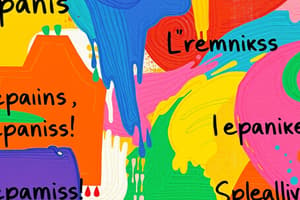Podcast
Questions and Answers
What does the term 'Kalikak' derive from?
What does the term 'Kalikak' derive from?
- A reference to a historical figure
- The Greek words for beauty and bad (correct)
- An ancient Roman family name
- The Latin terms for intelligence and ignorance
Which of the following was a discovery regarding the descendant of Martin Kallikak Jr.?
Which of the following was a discovery regarding the descendant of Martin Kallikak Jr.?
- Most of them had successful careers
- A significant portion were involved in illicit activities (correct)
- All descendants were found to be feeble-minded
- A majority were confirmed to be normal
What was the profession of the woman with whom Martin Kallikak Sr. had an illegitimate son?
What was the profession of the woman with whom Martin Kallikak Sr. had an illegitimate son?
- Quaker
- Teacher
- Prostitute (correct)
- Artist
How many descendants were traced from Martin Kallikak Jr. according to the study?
How many descendants were traced from Martin Kallikak Jr. according to the study?
Which of the following was NOT a category identified in the Kallikak family tree analysis?
Which of the following was NOT a category identified in the Kallikak family tree analysis?
What was the main focus of the studies conducted by advocates of the inheritance school like Dugdale?
What was the main focus of the studies conducted by advocates of the inheritance school like Dugdale?
According to Dugdale's findings, what percentage of Ada Juke's descendants were involved in prostitution?
According to Dugdale's findings, what percentage of Ada Juke's descendants were involved in prostitution?
What observation did Dugdale make about the criminal tendencies in families?
What observation did Dugdale make about the criminal tendencies in families?
What traits did Arthur H. Estabrook associate with the Jukes family in his 1915 assessment?
What traits did Arthur H. Estabrook associate with the Jukes family in his 1915 assessment?
How did Estabrook believe the Jukes families behaved when marrying into other families?
How did Estabrook believe the Jukes families behaved when marrying into other families?
Which of the following statements was NOT made by Dugdale regarding the Jukes family?
Which of the following statements was NOT made by Dugdale regarding the Jukes family?
What was the total count of illegitimate births among the 709 descendants of the Jukes as noted by Dugdale?
What was the total count of illegitimate births among the 709 descendants of the Jukes as noted by Dugdale?
Which family member was pointed out as 'the mother of criminals' in the Jukes family?
Which family member was pointed out as 'the mother of criminals' in the Jukes family?
Flashcards
Kallikak Family Study
Kallikak Family Study
A study by Henry H. Goddard tracing the lineage of Martin Kallikak, Sr., a revolutionary war soldier, to analyze the effects of heredity on traits like feeblemindedness.
Martin Kallikak Jr.
Martin Kallikak Jr.
Illegitimate son of Martin Kallikak, Sr., whose lineage was studied by Goddard. His descendants were generally seen as having undesirable traits.
Feeblemindedness
Feeblemindedness
A term used in the past to refer to individuals deemed intellectually deficient or having a low level of mental capacity.
Heredity's Impact (Kallikak)
Heredity's Impact (Kallikak)
Signup and view all the flashcards
Deborah (Study Subject)
Deborah (Study Subject)
Signup and view all the flashcards
Jukes Family Study
Jukes Family Study
Signup and view all the flashcards
Richard L. Dugdale
Richard L. Dugdale
Signup and view all the flashcards
Inheritance School
Inheritance School
Signup and view all the flashcards
Eugenics Record Office
Eugenics Record Office
Signup and view all the flashcards
Criminal Tendencies (Jukes)
Criminal Tendencies (Jukes)
Signup and view all the flashcards
Arthur H. Estabrook
Arthur H. Estabrook
Signup and view all the flashcards
Social Inferiority
Social Inferiority
Signup and view all the flashcards
Inheritance of Traits
Inheritance of Traits
Signup and view all the flashcards
Study Notes
Family Studies: The Jukes and Kallikak Families
- Researchers like Henry H. Goddard, Richard L. Dugdale, and Arthur H. Estabrook studied generations of families, specifically the "Jukes" and "Kallikaks," to find evidence of inherited traits linked to criminal behavior.
- They believed criminal tendencies were genetic and could be passed down through generations. These families were presented with pseudonyms.
- The Jukes Family: Richard L. Dugdale studied the Jukes lineage, starting with the five daughters of Max Juke. He traced descendants, finding high rates of prostitution, pauperism, and illegitimate births, concluding a strong connection between lineage and criminal behavior. Max Juke (the ancestor) was depicted as a hunter, fisherman, hard drinker, and a scandalous man. One daughter, Ada Juke (known as Margaret), had multiple illegitimate children, according to the researchers.
- The Kallikak Family: Henry H. Goddard studied Martin Kallikak, a revolutionary war soldier, tracing his two separate relationships. One was with a Quaker woman, the other was with a feeble-minded woman. He concluded that the descendants of the Quaker lineage were more orderly and less prone to criminal behavior. The descendants of the feeble-minded woman showed a high rate of feeble-mindedness, illegitimacy, prostitution, and criminal activity.
- Arthur H. Estabrook, working at the Eugenics Record Office, studied the Jukes nearly four decades later. His findings largely supported Dugdale's, indicating continued criminal behaviors in the later Jukes descendants.
- The Jukes and Kallikak studies concluded illegitimate children tended to have more criminal activity, that the burden of criminal activity in a family generally came from illegitimate lineages. Also, criminal activity was more frequent among males.
- Data collected from the studies included descendants who were prostitutes, thieves, brothel owners, alcoholics, and those with licentious behavior, among other conclusions.
- Subsequent studies, however, questioned the methodologies and biases present in the original "Jukes" and "Kallikak" studies.
Additional Findings / Data
- Data show substantial variations in the recorded criminal and social behaviors of the descendants
- The number of descendants involved in the study exceeds one thousand
- 262 of a large group traced were identified as feeble-minded
- 197 were considered normal
- 581 descendants remained undetermined
- 36 were illegitimate, 33 were sexually immoral (mostly prostitutes), 24 were confirmed alcoholics, and 3 were epileptics.
- 82 died in infancy. 3 were criminals, 8 had houses of ill repute
- The great-great-grandfather of Deborah (an 8-year-old who was interviewed) was Martin Kallikak, Jr.,
Studying That Suits You
Use AI to generate personalized quizzes and flashcards to suit your learning preferences.




